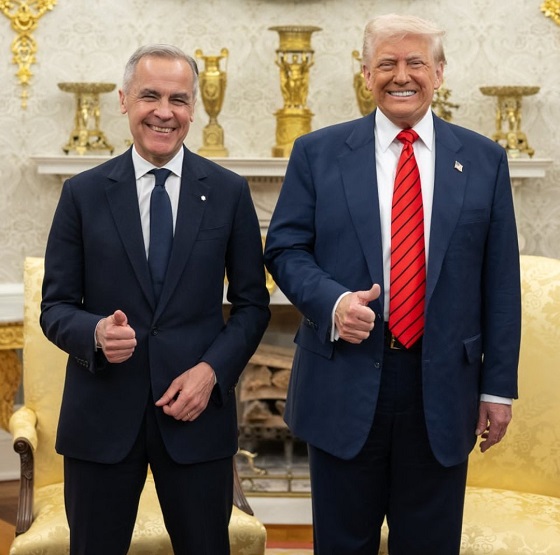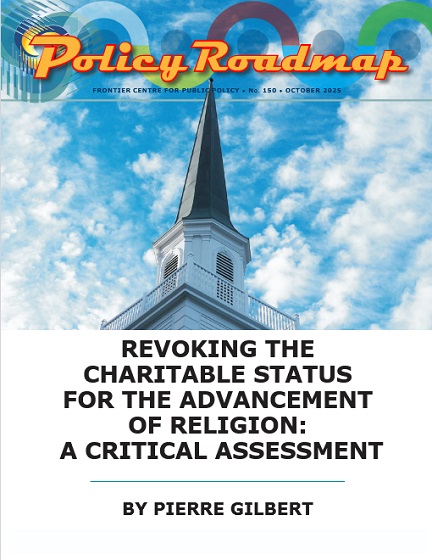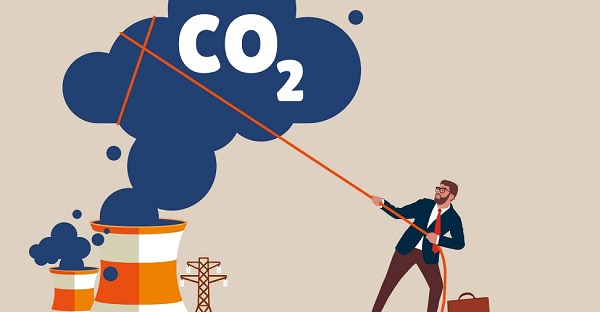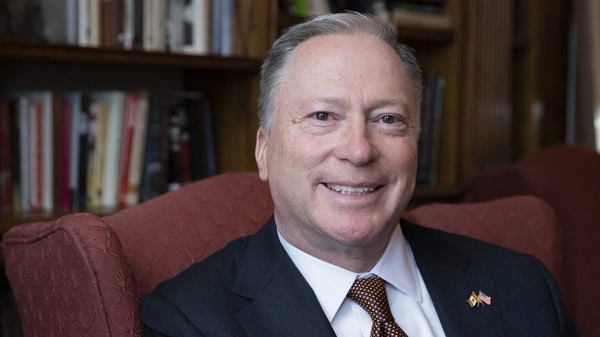Frontier Centre for Public Policy
Carney Is Acting Like A President, And That’s A Problem

From the Frontier Centre for Public Policy
Prime Minister Mark Carney’s scripted tax-cut spectacles are misleading and sidestep Canada’s constitutional rules. Carney chips away at the core of our parliamentary system by staging solo announcements that mimic President Trump. Canada isn’t a republic, and the prime minister isn’t a president. These theatrics bypass oversight and erode public trust.
Canadians are often frustrated by government red tape, bureaucratic black holes and delays. So when a politician like Prime Minister Mark Carney appears to “get things done,” it’s tempting to cheer.
But let’s not be so hasty.
Government is not meant to move at the speed of a press conference. Efficiency without oversight is not good governance, it’s unchecked power. Bypassing Parliament may look like a solution, but it’s an abuse of process.
History teaches this lesson well. The constitutional roots of our institutions, stretching back to England’s Magna Carta—a foundation of modern democracy—make clear that no ruler can take, or even give back, from the public purse without Parliament’s consent.
In Canada, this principle is enshrined in Section 53 of the Constitution Act, 1867, which requires that any bill imposing or changing taxes originate in the House of Commons. Not the Prime Minister’s Office. Not the cabinet table. The House.
This isn’t a dusty relic. It is the backbone of limited government, ensuring elected representatives hold the power of the purse.
So when the prime minister theatrically signs a sheet of paper at a cabinet meeting, purporting to “lower middle-class taxes,” that is not leadership. It’s a staged deception. And even though Carney has not been PM for very long, it is not the first time.
Only weeks ago, Carney staged a similar photo op, pretending to erase the consumer carbon tax with a dramatic signature. The problem? Prime ministers do not have the solo authority to change laws, and they do not sign Orders in Council. That power belongs to the Governor in Council—a formal decision made by cabinet, approved by the Governor General. It is not something a prime minister can do alone.
The ceremony was legally meaningless but theatrically effective. It was designed to channel Donald Trump’s bravado.
Another fake signing is another misleading spectacle. And while some might shrug, “At least he’s lowering taxes,” this misses the larger point.
There is no shortcut for tax cuts. They follow the same constitutional process as tax hikes. Cutting taxes often means shifting burdens elsewhere or altering spending priorities. One cannot be separated from the other.
Consider the 2006 GST cuts, from 7 per cent to 6 per cent and then to 5 per cent. Both reductions were passed through budget implementation acts, debated, voted on and approved by Parliament. The same was true for business tax cuts in 2015. This is how it works.
It’s not about whether taxes go up or down; it’s about Parliament’s rightful authority to decide.
Carney’s mimicking of presidential authority isn’t only an abuse of process. It strikes at Canada’s political identity.
This is not Trump’s America. Canada is a parliamentary democracy, not a presidential republic. The prime minister’s power comes from the confidence of the House of Commons, especially with a minority government, not from a personal mandate. His role is not “commander-in-chief” but a servant of Parliament.
When the prime minister plays dress-up as a president pretending to lower taxes with the stroke of a pen, he isn’t just misleading Canadians. He is shunning the traditions that make our system different from the United States.
And those traditions matter. They are not superficial. They define how power is distributed, checked and limited in Canada. These constitutional guardrails keep governments honest and prevent the slide into executive overreach.
A government that fakes the process to look good betrays an inclination to ignore limitations. Carney’s craving for the quick win—for the Trumpian photo op that “gets things done”—reveals a dangerous instinct: bypassing Parliament as it suits him.
Even more galling is the context of a Parliament improperly prorogued for months; Carney is sidelining parliamentary oversight. And in their contempt for Parliament, the new Carney government will not present a budget until the fall. The country has been without one for over a year—a cornerstone document that tells Canadians how their tax dollars will be spent. Instead, he chooses theatre.
As if the rules don’t apply. But they do.
This is about consent, not convenience. The process is a feature, not a flaw. It ensures no government can act unilaterally on taxes or spending. These procedures protect citizens from arbitrary executive action, regardless of how well-intentioned or well-staged. When leaders ignore those safeguards, it weakens public trust, concentrates power in fewer hands and chips away at the core principle of responsible government.
When leaders flout these rules for convenience, we should not celebrate it, nor should Carney continue the Trudeau-era habit of governing by spectacle, not substance.
Prime Minister Carney likes to say, “Canada is not for sale.” Fair enough. But neither are Canada’s parliamentary traditions. When a government pretends to wield presidential-like authority, it betrays process and identity since part of being Canadian is to have a Parliament that matters.
Ultimately, governments must follow the rules. In punting Trudeau, Canadians thought they were getting rid of stagecraft masquerading as governance. It seems they were mistaken.
Marco Navarro-Genie is the vice president of research at the Frontier Centre for Public Policy. He is coauthor, with Barry Cooper, of Canada’s COVID: The Story of a Pandemic Moral Panic (2023).
Business
Major Projects Office Another Case Of Liberal Political Theatre

From the Frontier Centre for Public Policy
By Lee Harding
Ottawa’s Major Projects Office is a fix for a mess the Liberals created—where approval now hinges on politics, not merit.
They are repeating their same old tricks, dressing up political favouritism as progress instead of cutting barriers for everyone
On Sept. 11, the Prime Minister’s Office announced five projects being examined by its Major Projects Office, all with the potential to be fast-tracked for approval and to get financial help. However, no one should get too excited. This is only a bad effort at fixing what government wrecked.
During the Trudeau years, and since, the Liberals have created a regulatory environment so daunting that companies need a trump card to get anything done. That’s why the Major Projects Office (MPO) exists.
“The MPO will work to fast-track nation-building projects by streamlining regulatory assessment and approvals and helping to structure financing, in close partnership with provinces, territories, Indigenous Peoples and private investors,” explains a government press release.
Canadians must not be fooled. A better solution would be to create a regulatory and tax environment where these projects can meet market demand through private investment. We don’t have that in Canada, which is why money has fled the country and our GDP growth per capita is near zero.
Instead of this less politicized and more even-handed approach, the Liberals have found a way to make their cabinet the only gatekeepers able to usher someone past the impossible process they created. Then, having done so, they can brag about what “they” got done.
The Fraser Institute has called out this system for its potential to incentivize bribes and kickbacks. The Liberals have such a track record of handing out projects and even judicial positions to their friends that such scenarios become easier to believe. Innumerable business groups will be kissing up to the Liberals just to get anything major done.
The government has created the need for more of itself, and it is following up in every way it can. Already, the federal government has set up offices across Canada for people to apply for such projects. Really? Anyone with enough dollars to pursue a major project can fly to Ottawa to make their pitch.
No, this is as much about the show as it is about results—and probably much more. It is all too reminiscent of another big-sounding, mostly ineffective program the Liberal government rolled out in 2017. They announced a $950-million Innovation Superclusters Initiative “designed to help strengthen Canada’s most promising clusters … while positioning Canadian firms for global leadership.”
That program allowed any company in the world to participate, with winners getting matching dollars from taxpayers for their proposals. (But all for the good of Canada, we were told.) More than 50 applications were made for these sweepstakes, which included more than 1,000 businesses and 350 other participants. In Trudeau Liberal fashion, every applicant had to articulate how their proposal would increase female jobs and leadership and encourage diversity in the long term.
The entire process was like one big Dragon’s Den series. The Liberals trotted out a list of contestants full of nice-sounding possibilities, with maximum hype and minimal reality. Late in the process, Minister of Innovation, Science and Industry Navdeep Bains picked the nine finalists himself (all based in cities with a Liberal MP), from which five would be chosen.
The alleged premise was to leverage local and regional commercial clusters, but that soon proved ridiculous. The “Clean, Low-energy, Effective and Remediated Supercluster” purported to power clean growth in mining in Ontario, Quebec and Vancouver. Not to be outdone, the “Mobility Systems and Technologies for the 21st Century Supercluster” included all three of these locations, plus Atlantic Canada. They were only clustered by their tendency to vote Liberal.
Today, the MPO repeats this virtue-signalling, politicking, drawn-out, tax-dollar-spending drama. The Red Chris Mine expansion in northwest British Columbia is one of the proposals under consideration. It would be done in conjunction with the Indigenous Tahltan Nation and is supposed to reduce greenhouse gas emissions by 70 per cent. That’s right up the Liberal alley.
Meanwhile, the project is somehow part of a proposed Northwest Critical Conservation Corridor that would cordon off an area the size of Greece from development. Is this economic growth or economic prohibition? This approach is more like the United Nations’ Agenda 2030 than it is nation-building. And it is more like the World Economic Forum’s “stakeholder capitalism” approach than it is free enterprise.
At least there are two gems among the five proposals. One is to expand capacity at the Port of Montreal, and another is to expand the Canada LNG facility in Kitimat, B.C. Both have a market case and clear economic benefits.
Even here, Canadians must ask themselves, why must the government use a bulldozer to get past the red tape it created? Why not cut the tape for everyone? The Liberals deserve little credit for knocking down a door they barred themselves.
Lee Harding is a research fellow for the Frontier Centre for Public Policy.
Business
Finance Committee Recommendation To Revoke Charitable Status For Religion Short Sighted And Destructive

From the Frontier Centre for Public Policy
A new report from the Frontier Centre for Public Policy warns that proposed changes to Canada’s Income Tax Act could have devastating consequences for churches and faith-based organizations nationwide.
Revoking the Charitable Status for the Advancement of Religion: A Critical Assessment, by senior fellow Pierre Gilbert, responds to the 2025 Standing Committee on Finance’s recommendation to remove “advancement of religion” as a recognized charitable purpose.
If adopted, the measure could strip churches, mosques, synagogues, temples and religious charities of their charitable status. The impact would include the loss of income tax exemptions and the inability to issue charitable tax receipts. They could also face a one-time penalty tax that effectively wipes out most of what they own.
“The committee’s recommendation, driven by lobbying from the BC Humanist Association, represents a direct threat to religious freedom and the vital role faith communities play in Canadian society,” said Gilbert. “Religious organizations contribute an estimated $16.5 billion annually to Canada through social services, education, community programs and cultural preservation. Revoking their charitable status would be both fiscally shortsighted and socially destructive.”
The report traces the origins of charitable status in English common law, examines the rise of secularism and fiscal pressures driving the proposed change, and calls on churches to proactively respond through education, advocacy and reasserting their public mission.
Download full PDF here. (30 pages)
-

 International2 days ago
International2 days agoNumber of young people identifying as ‘transgender’ declines sharply: report
-

 Alberta2 days ago
Alberta2 days agoThe Technical Pitfalls and Political Perils of “Decarbonized” Oil
-

 National1 day ago
National1 day agoDemocracy Watch Renews Push for Independent Prosecutor in SNC-Lavalin Case
-

 Alberta2 days ago
Alberta2 days agoEnbridge CEO says ‘there’s a good reason’ for Alberta to champion new oil pipeline
-

 Alberta23 hours ago
Alberta23 hours agoClick here to help choose Alberta’s new licence plate design
-

 Bruce Dowbiggin2 days ago
Bruce Dowbiggin2 days agoLong-Distance Field Goals Have Flipped The Field. Will The NFL Panic?
-

 Censorship Industrial Complex2 days ago
Censorship Industrial Complex2 days agoCanada’s privacy commissioner says he was not consulted on bill to ban dissidents from internet
-

 Business2 days ago
Business2 days ago“Nation Building,” Liberal Style: We’re Fixing a Sewer, You’re Welcome, Canada





